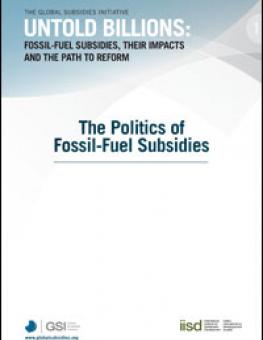
The Politics of Fossil-Fuel Subsidies
Governments spend staggering sums of money subsidizing fossil fuels, with many harmful consequences for public budgets, energy markets and pollution. While there is widespread agreement among analysts that most of these subsidies serve no legitimate purpose, cutting subsidies has proved extremely difficult. This paper explores the politics of subsidy creation and reform and suggests some strategies for improving the odds that reformers will be politically successful. Subsidies exist often because they are the only reliable mechanism available to governments that are under pressure to provide benefits to politically well-organized groups. Successful subsidy reforms often require broader reforms and improvement in public administration to create mechanisms that can compensate political losers.
Papers in this series:
- Untold Billions: Fossil-fuel subsidies, their impacts and the path to reform: A Summary of Key Findings
- Effects of Fossil-Fuel Subsidy Reform: A review of modelling and empirical studies
- The Politics of Fossil-Fuel Subsidies
- Strategies for Reforming Fossil-Fuel Subsidies: Practical lessons from Ghana, France and Senegal
- Gaining Traction: The importance of transparency in accelerating the reform of fossil-fuel subsidies
- Mapping the Characteristics of Producer Subsidies: A review of pilot country studies
For information about the GSI's other reports on fossil-fuel subsidies, click here.
You might also be interested in
Sustainable Asset Valuation of Sherwan Hill Adventure Park in Abbottabad, Pakistan
This report analyzes the social, economic, and environmental benefits of the Sherwan Hill Adventure Park in Pakistan.
December 2024 | Carbon Minefields Oil and Gas Exploration Monitor
In November 2024, 23 oil and gas exploration licences were awarded across five countries, with Russia granting the licences that account for the largest portion of embodied emissions.
Toward a Coherent, Transformative Approach to Financing Sustainable Development, Climate, and Nature
Four key proposals for the Fourth Financing for Development Conference (FfD4) to create an integrated, equitable approach to financing climate, nature, and development goals.
Green Public Procurement in India
This report analyzes the status of green public procurement (GPP) in India and suggests key strategies for advancing sustainable procurement practices.